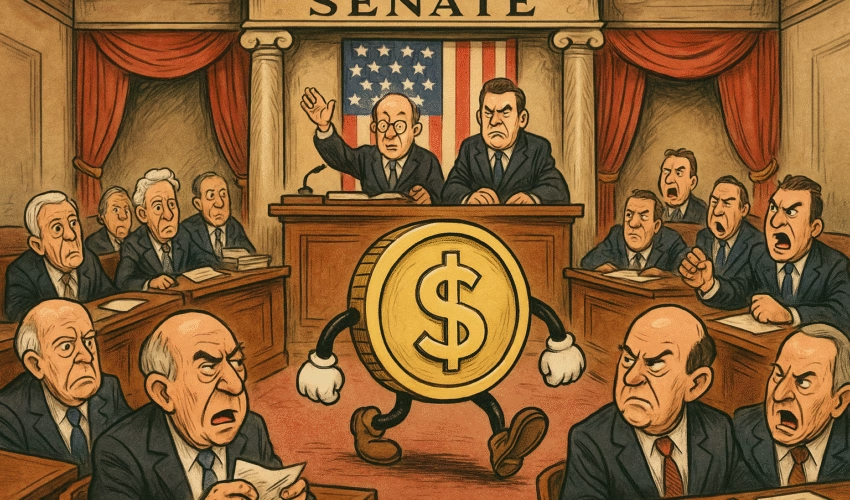Revised Stablecoin Bill Clears Procedural Vote After Initial Democratic Opposition
The United States Senate has voted to advance the Guiding and Establishing National Innovation for US Stablecoins Act (GENIUS Act), moving the key piece of crypto legislation closer to becoming law.
On May 20, the Senate passed a procedural cloture vote 66–32, allowing the bill to proceed to full floor debate. The advancement follows weeks of political wrangling, during which the bill was temporarily blocked by Democratic lawmakers over concerns surrounding President Donald Trump’s ties to crypto ventures.
Bill Targets $250B Stablecoin Market
Introduced by Senator Bill Hagerty on Feb. 4, the GENIUS Act aims to establish a regulatory framework for payment stablecoins — a market now worth nearly $250 billion, dominated by Tether (USDT) and Circle’s USDC.
Key provisions in the bill include:
-
Full asset backing for all stablecoins
-
Regular audits to ensure reserve compliance
-
Licensing and regulatory oversight at the federal or state level
-
A ban on algorithmic stablecoins
-
A clear distinction between payment-focused stablecoins and speculative digital assets
Bipartisan Momentum Grows After Revisions
The GENIUS Act faced resistance earlier this month, when several Democratic Senators withdrew support on May 8, citing anti-money laundering (AML) concerns and potential conflicts of interest stemming from Trump’s expanding crypto empire — which includes ties to stablecoin issuer World Liberty Financial.
However, the bill was revised shortly afterward to address bipartisan concerns, and enough Democrats flipped their votes to help it pass the recent motion.
“I think it’s a fair target to pass GENIUS by Memorial Day,” said Senator Cynthia Lummis, a key Republican supporter of the legislation.
The legislation builds on earlier proposals, including Representative Patrick McHenry’s Clarity for Payment Stablecoins Act, which laid foundational concepts for how fiat-backed digital currencies could be regulated.
What’s Next: Senate Floor Debate and Potential Passage by May 26
With the cloture vote secured, the bill is now slated for formal debate on the Senate floor, with potential passage expected by May 26 — Memorial Day in the United States.
If passed, the GENIUS Act would be one of the most comprehensive regulatory frameworks for stablecoins to emerge globally, potentially setting the standard for digital dollar-pegged assets and providing clarity for issuers, banks, and fintech firms.
Final Thoughts: Stablecoin Clarity May Finally Be Within Reach
The Senate’s advancement of the GENIUS Act represents a critical turning point in US crypto regulation, particularly as stablecoins play an increasingly central role in global payments, DeFi, and tokenized finance.
While the bill still faces debate and possible amendments, its bipartisan support and regulatory clarity goals suggest that the United States is finally moving toward a coherent national policy on stablecoins — a move likely to boost investor confidence, attract institutional capital, and accelerate blockchain adoption.












